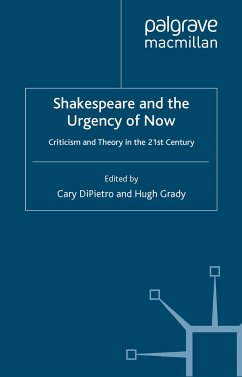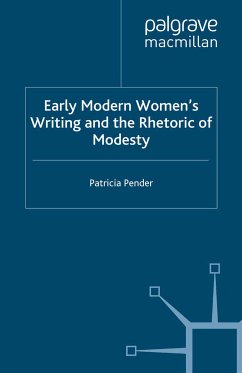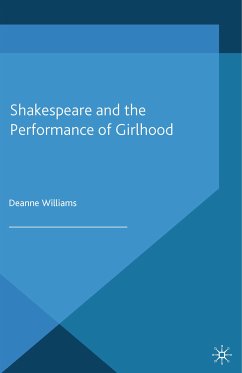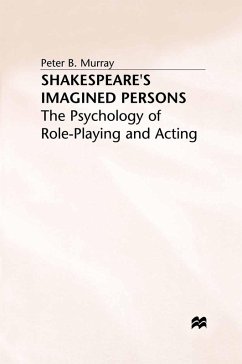
R. Knowles
eBook, PDF
Shakespeare's Arguments with History (eBook, PDF)

PAYBACK Punkte
36 °P sammeln!






Argument was the basis of Renaissance education; both rhetoric and dialectic permeated early modern humanist culture, including drama. This study approaches Shakespeare's history plays by analyzing the use of argument in the plays and examining the importance of argument in Renaissance culture. Knowles shows how analysis of arguments of speech and action take us to the core of the plays, in which Shakespeare interrogates the nature of political morality and truth as grounded in the history of what men do and say.
Dieser Download kann aus rechtlichen Gründen nur mit Rechnungsadresse in A, B, BG, CY, CZ, D, DK, EW, E, FIN, F, GR, HR, H, IRL, I, LT, L, LR, M, NL, PL, P, R, S, SLO, SK ausgeliefert werden.
- Geräte: PC
- ohne Kopierschutz
- eBook Hilfe
- Größe: 23.51MB
- Text-to-Speech
- E-Mail des Verlags für Barrierefreiheitsfragen: accessibilitysupport@springernature.com
- Keine Einschränkung der Vorlesefunktionen, außer bei spezifischen Ausnahmen
- Bekannt für fehlende wesentliche Barrierefreiheitsmerkmale
RONALD KNOWLES is Senior Lecturer in English Literature at the University of Reading. He is author and editor of books on Shakespeare, Charles II, Jonathan Swift and Harold Pinter, including Henry IV Parts I & II, The Critics Debate, Shakespeare and Carnival: After Bakhtin, and King Henry VI Part II, 'The Arden Shakespeare'.
Produktdetails
- Verlag: Palgrave Macmillan UK
- Seitenzahl: 235
- Erscheinungstermin: 21. Dezember 2001
- Englisch
- ISBN-13: 9781403913647
- Artikelnr.: 38450505
...important for students and faculty at all levels...' - Choice JV
DCCE4A7D-D675-44B8-95E0-FC99CDF2BFF3 379618 Electronic Book Text 370794 9780230618459 0230618456 The Persian Gulf in History E.Book Persian Gulf in History 06/01/2009 01/06/2009 56A Politics - USA Academic L. Potter 56A Politics - USA Academic US Domestic Pal Scholarly E7 - Distributed to Vendors E7 - Distributed to Vendors HBJF - Asian history; JPS - International relations HIS026000; POL010000; POL033000 Politics - Middle Eastern and North African (MENA) Politics; Middle Eastern and Central Asian Studies - Middle East History; Politics - Middle East Politics; History - Middle Eastern History Professional and Scholarly 19.99 38.00 10.1057/9780230618459 e-royalty:
DCCE4A7D-D675-44B8-95E0-FC99CDF2BFF3 379618 Electronic Book Text 370794 9780230618459 0230618456 The Persian Gulf in History E.Book Persian Gulf in History 06/01/2009 01/06/2009 56A Politics - USA Academic L. Potter 56A Politics - USA Academic US Domestic Pal Scholarly E7 - Distributed to Vendors E7 - Distributed to Vendors HBJF - Asian history; JPS - International relations HIS026000; POL010000; POL033000 Politics - Middle Eastern and North African (MENA) Politics; Middle Eastern and Central Asian Studies - Middle East History; Politics - Middle East Politics; History - Middle Eastern History Professional and Scholarly 19.99 38.00 10.1057/9780230618459 e-royalty:
Mehr anzeigen
5% net (5% net d2c) 319175648 Green PDF EBook 336 0 sa 2015-06-08 17:31:06.873 Introduction: Lawrence G. Potter * PART 1: GULF HISTORY AND SOCIETY * 1. The Archaeology and Early History of the Persian Gulf, D.T. Potts * 2. The Persian Gulf in Late Antiquity: The Sasanian Era (200-700 C.E.), Touraj Daryaee * 3. The Gulf in the Early Islamic Period: The Contribution of Archaeology to Regional History, Donald Whitcomb * 4. The Kings of Hormuz: From the beginning until the arrival of the Portuguese, Mohammad Bagher Vosoughi * 5. Boom and Bust: The Port of Basra in the Sixteenth and Seventeenth Centuries, Rudi Matthee * 6. The Arab Presence on the Iranian Coast of the Persian Gulf, Shahnaz Razieh Nadjmabadi * 7. Gulf Society: An Anthropological View of the Khalijis , their Evolution and Way of Life, William O. Beeman * PART 2: THE GULF AND THE INDIAN OCEAN * 8. The Cultural Unity of the Gulf and the Indian Ocean: A Longue Durée Historical Perspective, M. Redha Bhacker * 9. The Persian Gulf and the Swahili Coast: A History of Acculturation over the Longue Durée, Abdul Sheriff * 10. India and the Gulf: Encounters from the mid-Sixteenth to the mid-Twentieth Centuries, Patricia Risso * PART 3: THE ROLE OF OUTSIDERS * 11. The Portuguese Presence in the Persian Gulf, João Teles e Cunha * 12. Dutch Relations with the Persian Gulf, Willem Floor * 13. The Ottoman Role in the Gulf, Frederick Anscombe * 14 Britain and the Gulf: At the Periphery of Empire, J.E. Peterson * 15. The United States and the Persian Gulf in the Twentieth Century, Gary Sick Exploring the history of the Persian Gulf from ancient times until the present day, leading authorities treat the internal history of the region and describe the role outsiders have played there. The book focuses on the unity and identity of Gulf society and how the Gulf historically has been part of a cosmopolitan Indian Ocean world. Highly Topical: Persian Gulf is always in the news, and will be for foreseeable future given events in Iraq, Iran, Saudi Arabia, etc. Comprehensive Overview: Covers broad period in history and both the role of actors local to the Gulf and external actors that have sought to influence events. Leading Scholars: Contributors include some of the topnames in the field.
This book provides a fresh, strikingly original and informative reexamination of the history of the Persian Gulf. It encourages us to see the Gulf not as a collection of disparate states but as a unit, with a unique and common culture based on extensive trade, fluid movement of peoples, and a tolerance for diversity. It will be indispensable reading for anyone interested in a region whose strategic, political, economic and financial importance has grown spectacularly in the last four decades." - Shaul Bakhash, Clarence Robinson Professor of History, George Mason University "The Gulf countries, the keys to the security and economic future of the Middle East, receive meager attention, at best, in university studies. Few professors visit there, and those who visit but one or two countries inevitably come away with skewed impressions. Never has a general work on the history of a region been more sorely needed. And never has there been greater justification for presenting a history as a series of articles embodying various authorial viewpoints. Historical thinking about the Gulf as a whole is still in an embryonic stage, but this collection provides some of the insights that will help its speedy maturation." - Richard W. Bulliet, Professor of History, Columbia University "The 'Persian Gulf in History' brings together a collection of essays of outstanding importance and quality, each written by a leading authority in the field. This volume represents asignal achievement in the study of the Gulf as a single unit of analysis, from its earliest history until recent times. It also illustrates in fine detail the multiple connections and entanglements between the Gulf and the outside world, whether it be the Indian Ocean or the European and American powers. The picture that emerges is complex, richly textured and marks a new standard in the scholarship on this exceptionally important, yet understudied, part of the world." - Bernard Haykel, Professor of Near Eastern Studies, Princeton University
This book provides a fresh, strikingly original and informative reexamination of the history of the Persian Gulf. It encourages us to see the Gulf not as a collection of disparate states but as a unit, with a unique and common culture based on extensive trade, fluid movement of peoples, and a tolerance for diversity. It will be indispensable reading for anyone interested in a region whose strategic, political, economic and financial importance has grown spectacularly in the last four decades." - Shaul Bakhash, Clarence Robinson Professor of History, George Mason University "The Gulf countries, the keys to the security and economic future of the Middle East, receive meager attention, at best, in university studies. Few professors visit there, and those who visit but one or two countries inevitably come away with skewed impressions. Never has a general work on the history of a region been more sorely needed. And never has there been greater justification for presenting a history as a series of articles embodying various authorial viewpoints. Historical thinking about the Gulf as a whole is still in an embryonic stage, but this collection provides some of the insights that will help its speedy maturation." - Richard W. Bulliet, Professor of History, Columbia University "The 'Persian Gulf in History' brings together a collection of essays of outstanding importance and quality, each written by a leading authority in the field. This volume represents asignal achievement in the study of the Gulf as a single unit of analysis, from its earliest history until recent times. It also illustrates in fine detail the multiple connections and entanglements between the Gulf and the outside world, whether it be the Indian Ocean or the European and American powers. The picture that emerges is complex, richly textured and marks a new standard in the scholarship on this exceptionally important, yet understudied, part of the world." - Bernard Haykel, Professor of Near Eastern Studies, Princeton University
Schließen
Für dieses Produkt wurde noch keine Bewertung abgegeben. Wir würden uns sehr freuen, wenn du die erste Bewertung schreibst!
Eine Bewertung schreiben
Eine Bewertung schreiben
Andere Kunden interessierten sich für











